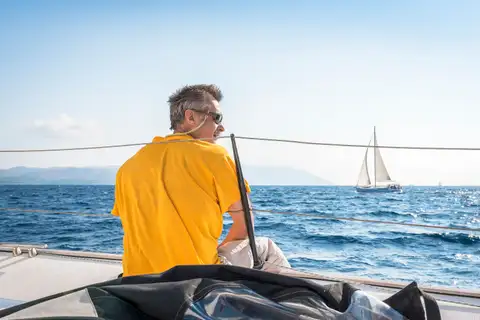
First time on a boat
Tips for seasickness sufferers
Practical guide to understanding what it is and how to cope with seasickness
Everyone can get seasick, but that is no reason to give up an unforgettable sailing experience
The body sometimes plays tricks on you: whether it is because of the rough sea or simply because you are not used to it, it is possible that you suffer from seasickness. Usually, it is enough to let a little time pass for the brain to properly read the signals received by the eyes and the organs responsible for balance, and the feeling of disorientation slowly dissipates. Other times, a slightly longer stretch of sailing and somewhat rough seas may put your stomach upside down until you dock in port. In any case, there are a few tricks to always keep in mind that will give you relief. If you are a first-timer, don't worry: before you know it you will be living your vacation completely carefree, and when you return, you will be looking forward to leaving again!
Excursions and boat trips for those who fear seasickness

What is seasickness and how to prevent it
Contrary to what you may think, seasickness is not caused by movement per se, but by the miscommunication between the eyes, the vestibular apparatus, that is, the organs in the inner ear responsible for balance, and the brain. Seasickness is generated when the eyes perceive the signal of immobility, while the vestibular apparatus perceives the signal of movement. These two conflicting stimuli create an uncoordination in the brain, which in turn generates an alarm signal for the entire organism, first blocking the digestive system and triggering the feeling of nausea.
There are all kinds of remedies, but the most reliable are certainly two.
First, eat! It is not advisable to go to sea on an empty stomach or with an overfull belly. Avoid alcohol, milk, carbonated drinks, coffee, tea or acidic drinks such as orange juice. Better to consume dry or salty foods such as crackers. Although eating is the last thing to come to mind in such cases, ingesting something solid always helps. Eating a banana is also helpful, as is holding a slice of lemon in your mouth. In addition, Coke and other carbonated drinks combat nausea as do salted anchovies.
Second, never go below deck. There, movements are expanded and there is little air. Stay outside, breathe and engage in something practical, such as operating the rudder. Concentrate on driving the boat: just as with driving a car, steering will make you forget about everything else. Otherwise, be quiet in a spot where you can see the sea well enough to predict the boat's movements. Ideally, sit in the cockpit strictly at the stern and watch the horizon so as to help your eyes, balance centers and brain coordinate signals.
3 things to do and 1 thing not to do to cope with seasickness in the best way
1
Experiment
If you want to set out for a week at sea but are afraid of how your stomach will hold up, start by trying a weekend sailing trip. You will have a chance to approach life on board gradually and see if you are ready for a full week. If, upon disembarking, the feeling will be that you have just gotten used to it and cut your vacation short at the best of times, then you can set off again completely carefree!
2
Putting everything you need in your bag
It is always better to be safe than sorry! So leave on a full stomach, but not too full: have a light lunch that will take away your hunger but not weigh you down, and take plenty of light, salty snacks with you throughout your vacation. Similarly, be careful when buying your galley: yes to carbohydrates, vegetables and fish, no to all heavy or poorly digestible foods. Also, pack suitable clothing in your bag so that you never suffer from the cold: take a jacket or sweatshirt with you even in summer.
3
Ask the skipper for advice
Every skipper knows that he might welcome people aboard who suffer from seasickness, and he sort of expects it! That is precisely why he is prepared for every eventuality and will be able to help you by giving useful advice or teaching you how to steer. If the condition of your stomach becomes tragic, do not be afraid or ashamed, surely the skipper has been there before!
4
Don't be afraid
Many of the cases of seasickness, in reality, are just given by fear: fear of being sick, of being nauseous and vomiting, or simply of the sailboat and its movements. Often it is precisely the novelty that generates fear and results in a feeling of nausea and a tight stomach. First, therefore, it is important to establish a relationship of trust with the skipper, observe his expert gestures, and be open to learning them firsthand: learning to sail will pass the time and also the fear!
Perfect destinations for a sailing holiday
Seasickness: in most cases, it can be avoided or cancelled.




7+
Show all
FAQ
Guides & tips

First time on a boat
5 reasons to take a sailing vacation

Perfect for
Perfect sailing vacations for families

First time on a boat
Guide to catamaran interior spaces

First time on a boat
7 semi-serious answers to doubts about the first sailing vacation

First time on a boat
The best destinations for your first time sailing

First time on a boat
What to bring on a sailing boat: the luggage
Let's talk Sailsquare!



Secure payments



© 2025 Sailsquare Srl SB • All rights reserved - VAT IT07860990964









